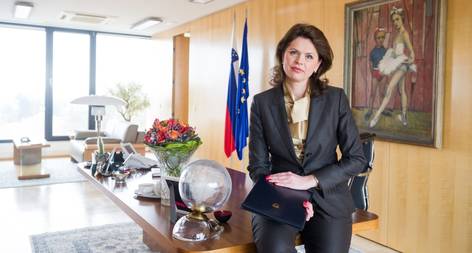NEWS
Message by the Prime Minister of the Republic of Slovenia, Alenka Bratušek, on the occasion of the Day of Slovenes in Prekmurje Incorporated into the Mother Nation
"We, the inhabitants of Slovenska krajina, solemnly declare that we have always been and
will always be and remain Slovenes."
On this day around ninety years ago, these words were very much alive in the north-east of the present-day Slovenia. In the 1920s, the people of Prekmurje clearly declared that "they love their mother tongue and the venerable historic name Slovenska krajina." Their active engagement in the Slovene cultural and political life at the beginning of the previous century led to numerous gatherings where thousands expressed their several hundred-year old aspirations for reintegration with the mother nation - aspirations that were also achieved. Less than a hundred years ago they opted for Slovenia thus demonstrating their affiliation to the Slovene nation. Celebrations marking this historical event, which has created the Slovenia we know today, remind us of a hundred-year struggle for survival that resulted in the population of Prekmurje becoming part of the common administrative and political environment. Prekmurje Slovenes spent centuries under the Hungarian rule, separated from their "own" nation, but nevertheless successfully nourished their dreams of cultural integration by being faithful to the Slovene culture, language and nation, handing them down from generation to generation. Ninety-four years ago, their hundred-year old wish came true.
As borders in a united Europe no longer give rise to protests, I would like to highlight the significance of declarations made at the beginning of the 20th century, which resonated in this part of today's Europe and rather than hatred speak about love and brotherhood. Supporters at gatherings used to stress with one voice that they "do not hate" but "love". Instead of learning from antagonism fuelled by fear and uncertainty, a hundred years later we can learn from the words of our ancestors who were united in love and not animosity. This very fact served as a basis for cooperation. Lessons can be drawn from recalling this landmark from the previous century.
Though the border was in dispute, wise and patriotic people perceived this as an opportunity and overcame their fear by "translating" it into hope and trust. These even now remain an integral part of the valuable Prekmurje crossroads of different languages, cultures and religions. Hope and trust have also enabled the survival of Prekmurje Slovenes. "We want" was the guiding principle of the Slovene, Hungarian and Croatian speaking inhabitants of Prekmurje. That is why the greatest day for Prekmurje should be seen not only in the light of its turbulent past but also in the spirit of hope for a better future. It must therefore be viewed as an opportunity for and a model of exemplary coexistence between national communities with different languages and religions – Slovenes, Hungarians, Roma, Germans and Jews live together on friendly terms in this small corner of Europe, regardless of the economic situation in the region. This rich coexistence can only be found in Prekmurje, a region which is considered by many to be marginalised, though I think the reason for these claims is in its geographical position. The way the majority of the Slovenes who live there accept all the others who speak differently and help them become actively engaged in everyday life through different activities speaks for itself.
As early as a hundred years ago, the hard lives of the people of Prekmurje, in particular those in the Goričko region, called for a more rapid development, industrialisation and a better transport accessibility of this part of Slovenia. Even now, after almost a hundred years, these aspirations for continuous development and progress remain an inevitable part of our everyday lives. However, there is still a great deal of work to be done to improve the standard of living: the development of agriculture, tourism, infrastructure, and cross-border cooperation will contribute to a better future.
Dear people of Prekmurje,
The Slovene Government has many obligations towards Prekmurje, but this help will not be provided only in the form of budget support. Budget funds, however, will, first and foremost, be used to create opportunities, while the people of Prekmurje, with their diligence, persistence and wisdom, will remain the driving force of progress. A number of national and European development projects and opportunities in tourism will bring economic growth and create new jobs, which I sincerely hope and wish will enable young people, in particular, to find new opportunities and motivation in their local environment. On the other hand, “being pushed to the margin” entails the proximity of Austria, Hungary and Croatia, which should become and remain an advantage, as the opening of borders creates a number of new opportunities, and strengthens neighbourly connections and friendly ties. Like the River Mura, which at the same time connects and inevitably divides. This beautiful part of our small country along the Mura is known for not only its beautiful landscape and the rich variety of dialects of the local people, but also its excellent music, food, and many creative individuals who increase the region’s visibility beyond its borders. This day should be the reason for your pride and joy, and all of Slovenia will join you in your celebrations.
Dear Prekmurje Slovenes and members of other ethnic communities in Prekmurje, I would like to offer my sincere congratulations to you on today’s national holiday.




